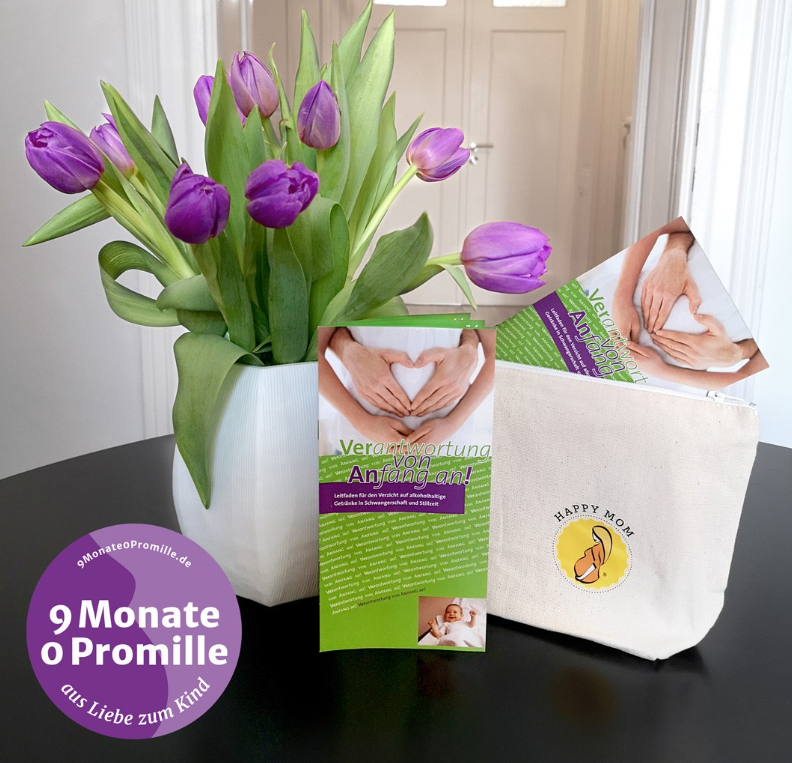
Foetal Alcohol Syndrome (FAS) presents a significant challenge due to its lifelong impacts, yet it is entirely preventable through abstention from alcohol during pregnancy. The initiative "Responsible from the Start!" (RftS) spearheads a multifaceted approach aimed at educating, empowering, and raising awareness among expectant mothers, young women, and society at large. With its diverse range of resources and collaborations, RftS embodies a comprehensive strategy to combat FAS.
At its core, RftS emphasizes the crucial message of "nine months, zero blood alcohol," advocating for complete abstention during pregnancy. This motto underscores the preventable nature of FAS and the imperative for expectant mothers to refrain from alcohol consumption. Through various channels including leaflets, a dedicated website (www.verantwortung-von-anfang-an.de ), and an Instagram channel ('9monate0promille'), RftS delivers practical tips, guidance, and expert insights to support individuals in maintaining their resolution to abstain from alcohol throughout pregnancy.
Established in 2009 by the BSI Working Group on Alcohol and Responsibility, RftS has evolved into a comprehensive prevention initiative with several key components. Central to its outreach are meticulously curated leaflets, addressing different demographics and aspects of FAS prevention. These leaflets cover topics such as guidance for pregnant and nursing women, essential information for girls regarding alcohol and pregnancy, and insights into Foetal Alcohol Spectrum Disorder (FASD). Authored in collaboration with experts like Dr. Reinhold Feldmann and Dr. Gisela Gille, these resources serve as invaluable tools for disseminating knowledge and promoting healthy behaviors.
The dissemination of information is a cornerstone of RftS's strategy, facilitated through partnerships with medical professionals, midwifery associations, counseling centers, and gynecologists. Distribution of thousands of leaflets, posters, and informational kits ensures widespread accessibility, reaching expectant mothers and young women across various healthcare settings. Moreover, integration into existing healthcare practices, such as inclusion in maternity record books and gynecological consultations, enhances the initiative's reach and impact.
RftS recognizes the pivotal role of education in preventing FAS, targeting not only expectant mothers but also adolescents and young girls. The provision of tailored resources for girls, distributed during gynecological consultations and educational workshops, fosters awareness and underscores the importance of alcohol abstinence during pregnancy. By engaging with adolescents early on, RftS endeavors to instill lifelong habits of responsibility and informed decision-making regarding alcohol consumption.
In the digital age, RftS harnesses the power of social media to amplify its message and engage with younger demographics. The launch of an Instagram channel in 2020 marked a significant milestone, enabling the initiative to reach a broader audience of young women and girls. Leveraging collaborations with influential figures and utilizing informative posts and expert contributions, RftS effectively utilizes social media as a platform for advocacy and awareness.
Furthermore, RftS's impact extends beyond informational campaigns, garnering support from various stakeholders in the medical and political spheres. Endorsements from prominent figures such as Prof. Dr. Anton J. Scharl, President of the German Society for Gynaecology and Obstetrics, and the Federal Drug Commissioner underscore the initiative's credibility and significance. Additionally, partnerships with organizations like the Bavarian Prevention Pact demonstrate RftS's commitment to aligning with broader public health initiatives.
In conclusion, "Responsible from the Start!" embodies a holistic and proactive approach to preventing FAS, emphasizing education, accessibility, and collaboration. By equipping individuals with knowledge, resources, and support networks, the initiative empowers expectant mothers and young women to make informed choices and prioritize the health and well-being of future generations. Regular evaluation of the leaflets targeting girls and women yielded positive results. (see more here) .